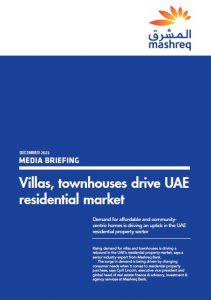Villas, townhouses drive UAE residential market

Demand for affordable and community-centric homes is driving an uptick in the UAE residential property sector
· Changing consumer behaviour such as demand for community-centric, open spaces is steering buyers towards detached and semi-detached villas and townhouses
· Villas in the UAE are seeing greater capital appreciation than apartments
· Visa-related reforms are creating attractive investment opportunities for local and foreign buyers in the UAE
· Expo 2020 is boosting short-term leasing, but long-term impact remains to be seen
Download the media briefing here
UAE, December 2021: Rising demand for villas and townhouses is driving a rebound in the UAE’s residential property market, says a senior industry expert from Mashreq Bank.
The surge in demand is being driven by changing consumer needs when it comes to residential property purchase, says Cyril Lincoln, executive vice president and global head of real estate finance & advisory, investment & agency services at Mashreq Bank.
Spurred by trends including remote working and community-living, villas and townhouses are emerging as the preferred choice for residential property buyers.
“Expatriate families are now looking for more open spaces in the form of detached or semi-detached houses,” says Lincoln. “Affordability is still an important factor, but there is greater demand for community-centred homes.”
Gains in property values
Villas and townhouses are seeing greater capital appreciation when compared to apartments. An October 2021 report from consulting group ValuStrat shows that residential value price index (VPI) for Dubai has improved 12.6 per cent year-on-year. 13 villa locations and 21 apartment areas monitored by the VPI have seen their capital values either stabilise or improve when compared to the previous month.
Another factor supporting demand for residential property in Dubai and the UAE is its popularity with ‘digital nomads’, says Lincoln.
“The fact that a person can work remotely while still living in Dubai is a huge pull for people. They see the tax benefits and lifestyle opportunities and are keen to call this city their home.”
Moreover, over recent years, the UAE government has issued directives making it easier for expatriates to obtain and retain residential visas. Lincoln says initiatives including golden visas and visas for retirees are gradually creating the UAE’s image as a ‘permanent home’
Expo 2020 sparks short-term boost
Since its launch on 1 October 2021, Expo 2020 Dubai has seen a healthy footfall. Its post-event impact on Dubai’s real estate sector, however, remains uncertain.
“Short-term leasing is definitely seeing an uptick in districts nearest to the Expo site, as visitors and staff are occupying homes on a temporary basis,” says Lincoln. “But we cannot be certain what the trend will be after April 2022.”
From a rental perspective, the market remained favourable for tenants well into 2021. However, Dubai is beginning to observe a rise in rates, with a 2.48 per cent year-on-year (y-o-y) increase according to data from property information firm ReidIn. Abu Dhabi on the other hand has seen a 2.56 per cent y-o-y decline.
The expo is playing an important role in positioning the UAE as an attractive opportunity for foreign investors, which Lincoln says will help propel the real estate market further. And it is expected that short-term visitors could turn into long-term residents.Property developers have already announced intentions to widen portfolios in the emirate, however some analysts still advise caution.
In October 2021, analysis from S&P Global ratings said that “structural oversupply of residential properties will challenge price increases over the long term, making the recovery fragile”.



